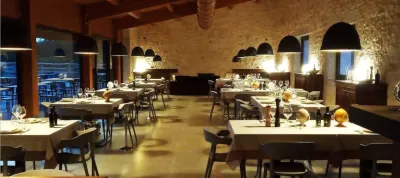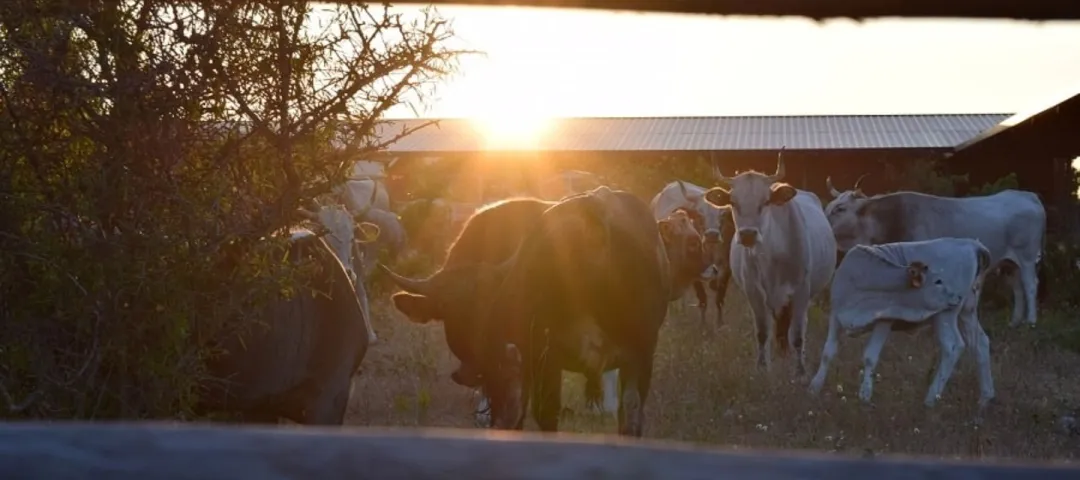General information
RDP Priority
- P2. Competitiveness
- P4. Ecosystems management
RDP Focus Area
- 2A: Farm’s performance, restructuring & modernisation
- 4A: Biodiversity restoration, preservation & enhancement
RDP Measure
- M04: Investments in physical assets
- M06: Farm & business development
Beneficiary type
- Farmer / land manager
Summary
So-called 'whole farm' approaches help agrifood businesses maximise the benefits of the CAP when applying for and utilising EU funds. Whole farm approaches promote efficiency by assessing the entire farm system rather than isolated components, identifying synergies and reducing waste, which leads to cost savings and improved productivity.
The advantages of whole farm approaches can be seen at the Donnapaola holding in southern Italy’s Puglia region. It has blended funding from the CAP for generational renewal, business investments and rural hospitality services, all within a strong creative philosophy. The farm covers almost 300 hectares of arid land within a nature-protected area.
The EU funds were used between 2016 and 2024 to help with farm costs associated with converting arid land into diversified and productive food production systems, in ways that also provide wider rural development opportunities for medicinal remedies, niche arts, and tourism.
Results
- The results of whole farm assistance from different CAP measures enabled the farming family to retain and strengthen their business and livelihood.
- Five jobs were safeguarded by the different funds for farm operations.
- A herd of 500 cattle demonstrates the farm’s viability.
- Visitors are attracted to enjoy the novel concept of ‘story-living’.
- The potential of local medicinal plants continues to provide additional diversification opportunities.

Promoter
Paola Labarile – Donnapaola Società Benefit SRL Società Agricola
Funding
Total cost: 3 987 825 (EUR)
RDP support: 1 487 825 (EUR)
Private: 2 500 000 (EUR)
Ressourcen
Context
EU funds from the CAP provide a range of opportunities to support sustainable agricultural practices. One effective strategy for farmers to maximise the benefits of the CAP is to adopt 'whole farm' approaches when applying for and utilising EU funds.
Whole farm approaches promote resource efficiency by encouraging farmers to optimise inputs across all operations. By assessing the entire farm system rather than isolated components, farmers can identify synergies and reduce waste, leading to cost savings and improved productivity. This efficiency is crucial in an era where input costs are rising due to global market fluctuations.
A coordinated schedule of EU funding can also allow for greater flexibility in financial planning. Whole farm applications enable farmers to access multiple funding sources simultaneously or sequentially. This multifaceted funding strategy enhances financial stability and reduces reliance on single income streams. Additionally, whole farm approaches foster innovation among farmers as they experiment with new techniques and technologies across their entire operation. The collaborative nature inherent in whole farm management often leads to knowledge sharing among neighbours and peers, facilitating continuous improvement in sustainable practices that align with EU competitiveness goals.
The advantages of whole farm approaches can be seen at the Donnapaola holding in southern Italy’s Puglia region. It has blended funding from the CAP for generational renewal, business investments and rural hospitality services within a strong creative philosophy. The farm covers almost 300 hectares of semi-arid land within a protected area.
Objectives
Overall, the aims within this whole farm example involved using CAP funds to help convert arid land into diversified and productive food production systems, in ways that also provide wider rural development possibilities for niche arts and tourism.
Specific objectives across the farm have included:
- Recovering arid land for high-welfare cattle farming.
- Mapping and recovery of medicinal plants.
- Creation of a rural and cultural community hub.
- Activation of experiential rural tourism.
- Animation of rural traditions and regional identity.
Activities
Interrelated aspects of the whole farm approach in this case have involved funding awards from the CAP for:
- Young farmer business start-up support promotes agricultural entrepreneurship, ensuring generational renewal and creating innovative companies that develop new products and market outlets, while supporting and consolidating the socioeconomic fabric in rural areas (M6.1 – 4.1 B).
- Redevelopment of dry-stone walls and existing buildings for preserving, protecting and spreading biodiversity within agro-forestry systems of high nature value, mitigating hydrogeological risks, and improving soil management (M4.4A).
- Construction compliance with landscape constraints in a Natura 2000 Area (SCI, SPA, IBA) of high nature value (M4.4A).
- Completing new prototypes of farm buildings that are well integrated into the surrounding environment and made with eco-sustainable materials (stone and wood) (M6.1 – 4.1 B).
- On-farm agritourism facilities and rural cultural developments for visitors (M6.4).
Main results
- The collective results of this entire holding assistance have enabled the farming family to retain and strengthen their business and livelihood.
- Five jobs were safeguarded by the farm's income sources.
- A herd of 500 traditional Podolian cattle demonstrates the farm’s viability and commitment to its historical surroundings.
- Visitors are drawn to enjoy the farm facilities, which offer both education and entertainment, utilising a novel concept of ‘story-living’.
- The potential of local medicinal plants continues to provide additional diversification opportunities, as evidenced by the 500 herbal essences identified in the farm area.
Key lessons
- Whole farm business strategies encompass a holistic view of farm management, integrating various aspects of production, environmental stewardship, and economic viability.
- By integrating ecological considerations into their farming systems, producers are more likely to qualify for specific CAP measures that aim to promote biodiversity and soil health. This alignment not only benefits the environment but also enhances marketability through adherence to consumer demand for sustainable products.
- It is possible to create artistic residencies, contemporary art laboratories in close contact with nature, in every corner of European regions. What differentiates and makes the visitor's experience unique in this case are the specificities of the individual rural area.
- Catchy concepts like ‘story-living’ on farms offer new opportunities for promoting rural tourism.
The Arts Farm of Donnapaola includes a study and training centre for art and environmental biodiversity which explores innovative themes emerging at an international level about relationships between art, agriculture, biodiversity, and ecosystems. An archive of knowledge on the Alta Murgia is dedicated to collecting memories, narratives, songs, rituals, traditions, landscapes and hopes for the future of rural culture. An international Academy of food and wine cultures promotes the essence of food and wine cultures.
Contact Information
Project email - donnapaolasrl@gmail.com
Vito Labarile

